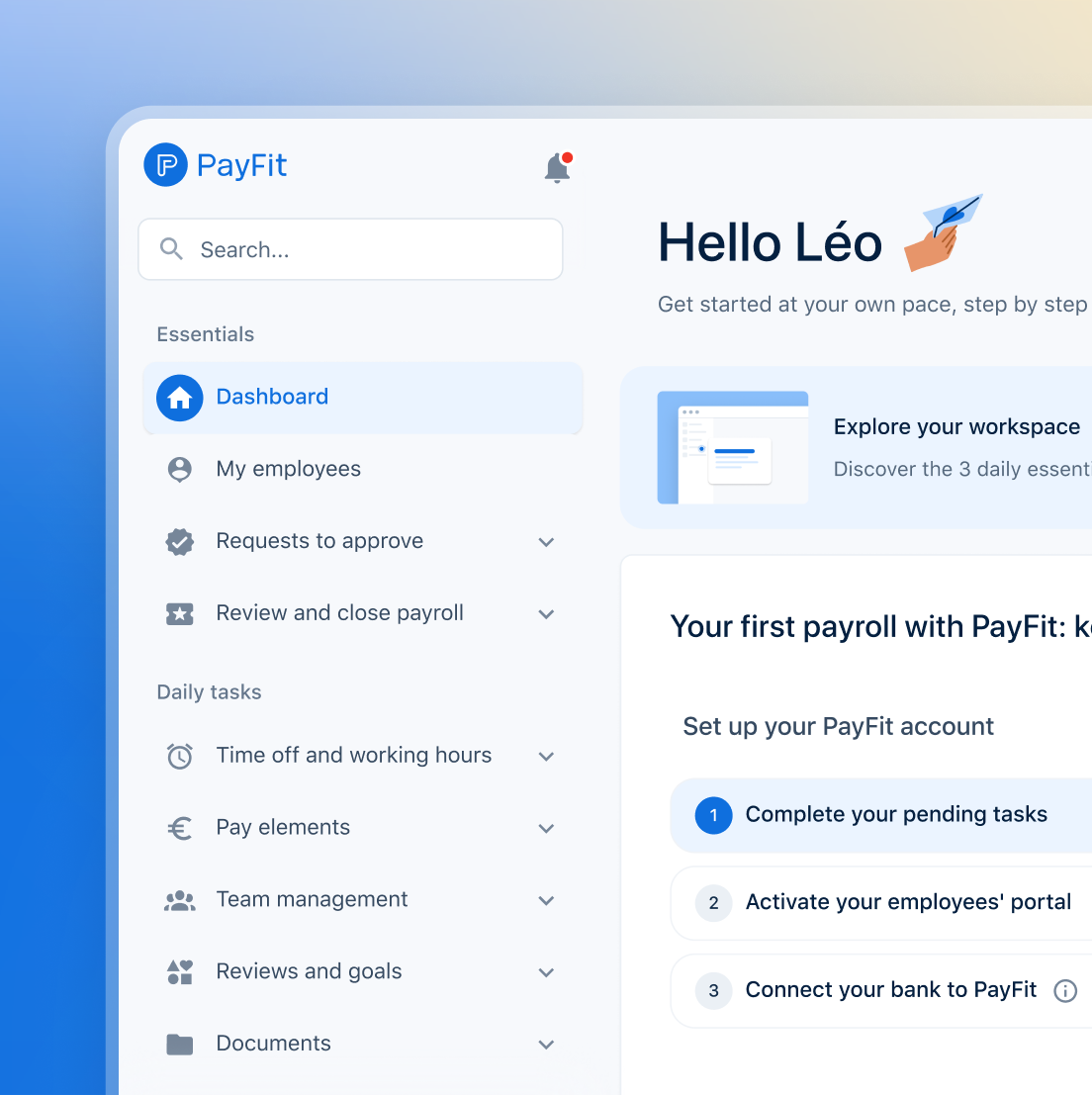✨ Health insurance, now in PayFit - learn more
💷 All the rates & thresholds you need to know for 25/26...right here
✨ The Payroll Journey: Start, Scale & Succeed Globally - learn more
✨ Health insurance, now in PayFit - learn more
💷 All the rates & thresholds you need to know for 25/26...right here
✨ The Payroll Journey: Start, Scale & Succeed Globally - learn more

For HR managers in growing UK businesses, the recruitment process is a critical function that can significantly impact organisational success. A well-structured recruitment and selection process not only helps in finding the right talent, but also strengthens the company’s brand and culture. This guide will walk you through the various phases of recruiting, offering clear guidance and best practices to help you attract and retain top talent.
The UK recruitment process is a multi-faceted journey that begins long before a job advert is posted. To ensure you find the best person for the role, it’s essential to follow a structured approach. The main stages of the recruitment process include:
This initial stage involves defining the role and identifying the necessary skills and desired experience needed for the position. A thorough job analysis will help you create an accurate job description and person specification, which are crucial for attracting the right candidates. How hirers and managers prepare for the recruitment process starts here, with a clear understanding of the team’s needs and the position’s requirements.
Once you have a clear job description, the next step is to source candidates. There are diverse methods of recruitment to consider. One of the key advantages of the internal recruitment process is that it can be a cost-effective way to fill a vacancy, while also boosting employee morale. However, looking externally can bring fresh perspectives and new skills into the business. The other advantages of the external recruitment process include a larger and more diverse pool of applicants. You can use online job boards, your company careers page, social media platforms such as LinkedIn, and recruitment agencies. Also, don’t underestimate the power of employee referrals, as they can often lead to high-quality hires.
This stage involves reviewing applications and shortlisting the most promising candidates. This can be a time-consuming part of the process, especially if you receive a high volume of applicants. This is where recruitment process automation can be a game-changer. An Applicant Tracking System (ATS), for example, can help you efficiently screen and manage applications, freeing up valuable time for your hiring team.
The selection stage is where you get to know your shortlisted candidates better. This typically involves a structured interview process, which can be conducted in various formats, such as by phone, by video, or in-person. It is also common to use assessments, such as skills tests or personality questionnaires, to gain a deeper understanding of a candidate’s abilities and potential cultural fit. The interview process is a two-way street; it’s an opportunity both for the candidate to learn more about your company, and for you to assess their suitability for the role.
Once you have identified the right candidate, it’s time to make a job offer. The offer should be competitive and clearly outline the terms of employment, including salary and start date. After the offer is accepted, the final stage is onboarding. A well-planned onboarding process is crucial for helping your new employees to settle in and become productive members of the team.

In today’s competitive job market, attracting top talent requires more than just a good salary. Companies need to create a compelling employer brand, and offer an attractive employee value proposition. So, how can companies effectively attract top talent?
Competitive compensation and benefits: While salary is important, a comprehensive benefits package can be a real differentiator. Consider offering employee benefits such as flexible work arrangements, private health insurance, and generous holiday entitlement.
A positive company culture: A strong and positive company culture is a magnet for top talent. Foster a collaborative and inclusive work environment where employees feel valued and respected. Building a collaborative reward strategy can help to reinforce your company’s culture and values.
Opportunities for growth and development: Ambitious individuals are always looking for opportunities to learn and grow. Provide your employees with clear career progression paths and access to training and development programs to help them gain valuable professional experience.

Technology has transformed the recruiting landscape by offering a wide range of tools to streamline the hiring process and enhance the candidate experience. From recruitment process automation through to data-driven insights, technology has become an indispensable tool for modern recruiters.
Applicant Tracking Systems (ATS): As mentioned earlier, an ATS can automate many of the administrative tasks involved in recruitment, such as screening CVs, scheduling the first interview, and communicating with candidates, today also by leveraging artificial intelligence (AI).
Video interviewing: Video interviews have become increasingly popular, offering a convenient and cost-effective way to interview candidates for any position from various different geographical locations.
Data and analytics: Recruitment technology can provide valuable data and insights to help you make more informed hiring decisions. You can track key metrics such as time-to-hire, cost-per-hire, and source-of-hire to optimise your recruitment strategy.
When recruiting in the UK, it’s essential to be aware of the legal and compliance requirements to ensure a fair and non-discriminatory process. Key legal considerations include:
The Equality Act 2010
This act prohibits discrimination on the grounds of protected characteristics, such as age, disability, gender, race, and religion.
Artificial Intelligence Guidance
The UK Government has issued specific guidance on the use of artificial intelligence (AI) in the recruitment process, in order to help prevent discrimination, the perpetuation of biases, and digital exclusion.
Right to work checks
You must verify that all new employees have the legal right to work in the UK.
Data protection
The General Data Protection Regulation (GDPR) governs how you can collect, process and store candidate data during the employment application process.
By following these guidelines and leveraging the right tools and strategies, growing businesses in the UK can navigate the complexities of the recruitment process and build a talented team that will drive their organisation forward. For further reading on how to align your HR and finance teams for strategic success, check out our article on finance and HR collaboration.


Recruitment costs go beyond job ads and agencies. Learn how UK employers can calculate the true cost of hiring and reduce hidden recruitment costs.

Discover the true cost of employing someone in the UK, including updated NI rates, pension contributions, and hidden expenses.

One of the most powerful and often underutilised staffing strategies is looking within. Here, we break down internal recruitment for UK businesses.

Despite the significant job losses that have occurred as a result of the pandemic, some organisations have continued to recruit. Discover how they've adapted their recruitment processes and hear from an industry expert on the future of recruitment post-pandemic.

You only get one first impression. Building a strong onboarding process is the best way to welcome and retain new employees.

See what's new in PayFit
New features to save you time and give you back control. Watch now to see what's possible